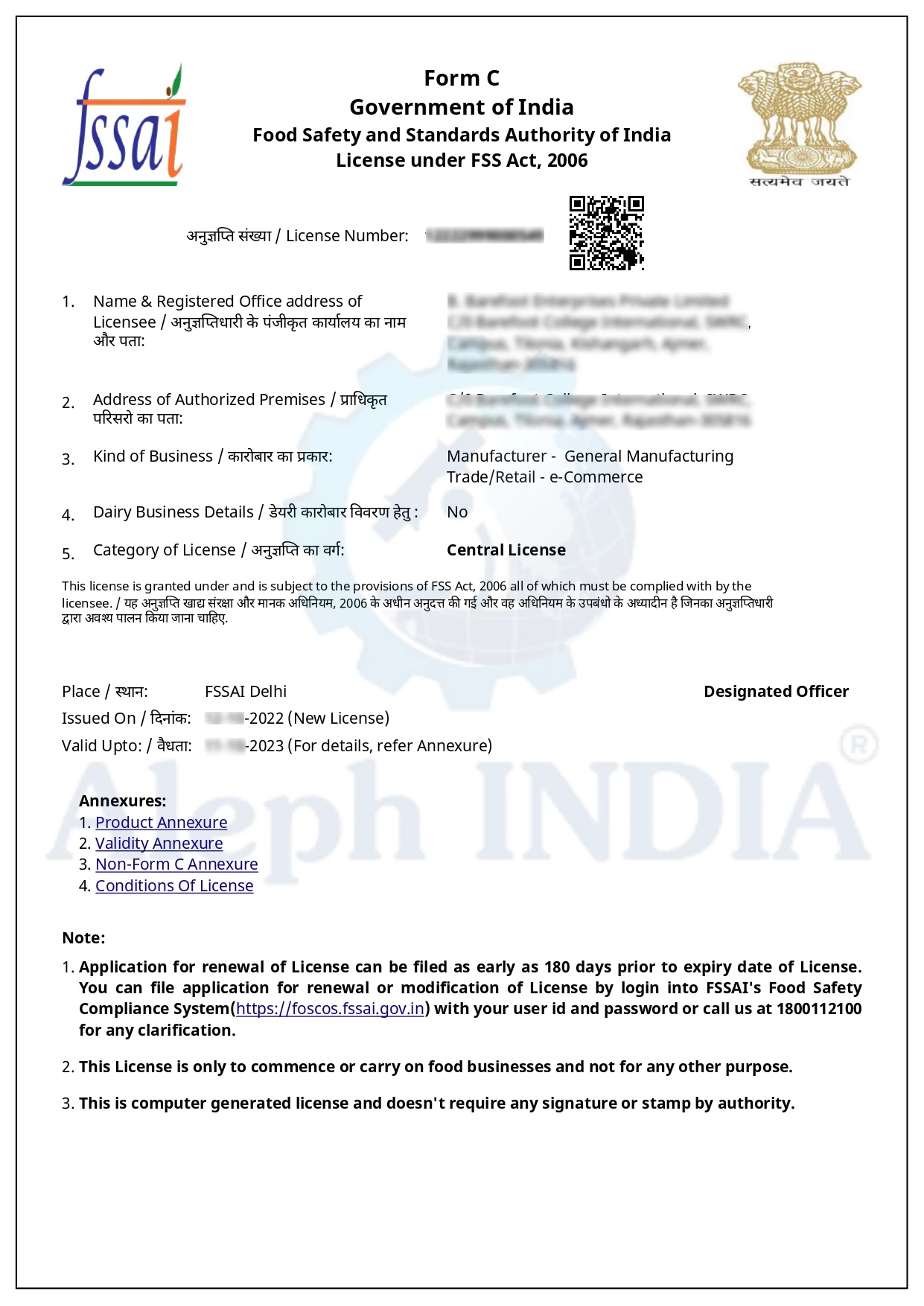Skip to main content
Introduction to FSSAI
FSSAI: Although the food industry has become one of the most in-demand sectors, it still lacks full reliability in the eyes of everyday consumers. One of the major challenges in modern society is the adulteration, contamination, or inclusion of harmful additives in natural food products. Low-quality adulterants are often introduced for economic or technical reasons, compromising the safety and quality of food.
To address this issue, the Government of India established the Food Safety and Standards Authority of India (FSSAI), which is responsible for monitoring, regulating, and inspecting the processes involved in the manufacturing, storage, packaging, and handling of food by food business operators. The primary goal of FSSAI is to supervise food safety and promote public health. This authority ensures that food products are pure, meet safety standards, and are free from substandard or harmful ingredients.
What is FSSAI?
FSSAI stands for the Food Safety and Standards Authority of India, an autonomous body established under the Ministry of Health & Family Welfare, Government of India. It was launched on 5 August 2011 by Former Union Minister Dr. Anbumani Ramadoss under the Food Safety and Standards Act, 2006.
The Act was enacted to enhance food safety, cleanliness, and quality, significantly transforming the food industry in India. FSSAI operates through six regional offices located in Delhi, Guwahati, Mumbai, Kolkata, Cochin, and Chennai. According to the Act, no individual or entity may operate a food business without acquiring an FSSAI license or registration. This requirement applies to all food business operators (FBOs) involved in manufacturing, processing, packaging, storing, or distributing food.
Types of FSSAI Registration/License
- FSSAI Basic Registration License
Issued by the State Government to petty food businesses and small operators with an annual turnover of less than ₹12 lakh. Validity ranges from 1 to 5 years. Registration is completed within 7 days.
- FSSAI State License
Applicable to small and medium enterprises operating in a single state with turnover between ₹12 lakh and ₹20 crore. Issued by the State Government and processed in 15 days. Valid for 1 to 5 years.
- FSSAI Central License
Issued by the Central Government for large businesses and those operating across multiple states with turnover above ₹20 crore. The central license takes around 25 days and is valid for 1 to 5 years.
Functions of FSSAI
- Setting Rules and Guidelines – Develops and enforces standards for food safety and hygiene across the industry.
- Granting Licenses – Issues licenses and certifications to food business operators to ensure legal compliance.
- Testing Food Standards – Conducts testing and quality checks to ensure food products meet the required standards.
- Regular Audits – Performs inspections and audits to ensure ongoing compliance with safety standards.
- Spreading Food Safety Awareness – Educates the public and food operators on the importance of clean and safe food.
- Maintaining Records and Data – Keeps comprehensive records of registered businesses; violations can lead to license cancellation.
- Advising the Government – Reports potential threats and assists the government in developing policies on food safety.
Documents Required for FSSAI Registration
The documentation required for FSSAI registration varies depending on the type of license. However, the following are common documents needed for the registration process:
- Copy of address proof
- Manufacturing process with a flow chart
- Manufacturing layout
- Brand certification
- Testing facility
- Equipment list
- Proof of possession of premises
- No Objection Certificate (NOC) from the municipality and local body
- NOC/PA issued by FSSAI
- Contact details of Directors
- FSSAI declaration form
- Source of milk (if applicable)
Procedure for FSSAI Registration
- Documentation: Collect all the necessary documents as per your business type for the FSSAI registration.
- Online Submission of Application: Once you have the required documents, visit the FSSAI website and submit the application online to the food safety department.
- Submission of Hardcopy Application: Submit the hard copy of the application along with the documents to the Food and Safety department.
- Scrutiny: FSSAI officials will review the application. Within 7 days of submission, the department may either accept or reject the application.
- Inspection by FSSAI: Following document scrutiny, FSSAI officials may visit your premises for an inspection (this step is optional, depending on the application type).
- Grant of FSSAI Certificate: Upon successful approval, the FSSAI department will issue a registration certificate that includes the registration number and applicant's photo.
Sample of a Grant Certificate for FSSAI

For Whom FSSAI License is Mandatory in India
Whether you're starting a food processing business, trading, repacking, wholesaling, marketing, operating a canteen, or running a restaurant, obtaining an FSSAI license is a requirement. According to the Food Safety and Standards Act, 2006, it is mandatory for the following categories of businesses to obtain FSSAI Registration or License:
- All types of food manufacturers
- Raw food suppliers
- Exporters and importers of food products
- Food storage and packaging units
- Food traders
- Food product retailers
- Online food business operators
- Caterers or hotels
- Food products transporters and distributors
- Wholesale food business operators
Timeline for FSSAI License
The timeline for obtaining an FSSAI license depends on the type of license you're applying for. Below is a rough estimate of the processing times:
- Basic License: 7 days
- State License: 15 - 30 days
- Central License: 30 - 60 days
Renewal of FSSAI License
The validity of the FSSAI license varies from 1 to 5 years depending on the fee paid during application. It is crucial to renew the license before it expires to avoid any disruptions in your business operations. Make sure to apply for renewal at least 30 days before the expiration date of your current license.
